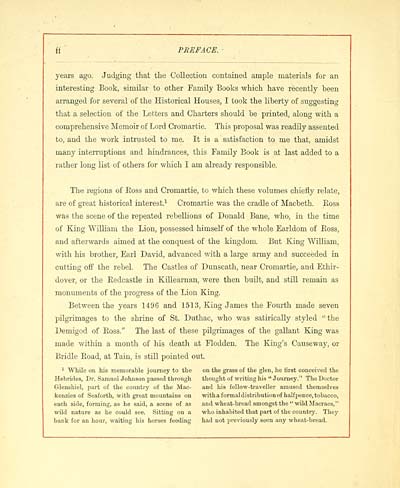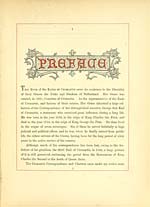Earls of Cromartie > [NSLBLANK]
(8)
Download files
Complete book:
Individual page:
Thumbnail gallery: Grid view | List view

PREFACE.
years ago. Judging that the Collection contained ample materials for an
interesting Book, similar to other Family Books which have recently been
arranged for several of the Historical Houses, I took the liberty of suggesting
that a selection of the Letters and Charters should be printed, along with a
comprehensive Memoir of Lord Cromartie. This proposal was readily assented
to, and the work intrusted to me. It is a satisfaction to me that, amidst
many interruptions and hindrances, this Family Book is at last added to a
rather long list of others for which I am already responsible.
The regions of Boss and Cromartie, to which these volumes chiefly relate,
are of great historical interest. 1 Cromartie was the cradle of Macbeth. Boss
was the scene of the repeated rebellions of Donald Bane, who, in the time
of King William the Lion, possessed himself of the whole Earldom of Boss,
and afterwards aimed at the conquest of the kingdom. But King William,
with his brother, Earl David, advanced with a large army and succeeded in
cutting off the rebel. The Castles of Dunscath, near Cromartie, and Ethir-
dover, or the Bedcastle in Killearnan, were then built, and still remain as
monuments of the progress of the Lion King.
Between the years 1496 and 1513, King James the Fourth made seven
pilgrimages to the shrine of St. Duthac, who was satirically styled "the
Demigod of Boss." The last of these pilgrimages of the gallant King was
made within a month of his death at Flodden. The King's Causeway, or
Bridle Boad, at Tain, is still pointed out.
1 While on his memorable journey to the on the grass of the glen, lie first conceived the
Hebrides, Dr. Samuel Johnson passed through thought of writing his " Journey." The Doctor
Glenshiel, part of the country of the Mac- and his fellow-traveller amused themselves
kenzies of Seaforth, with great mountains on with a formal distribution of halfpence, tobacco,
each side, forming, as he said, a scene of as and wheat-bread amongst the "wild Macraes,"
wild nature as he could see. Sitting on a who inhabited that part of the country. They
bank for an hour, waiting his horses feeding had not previously seen any wheat-bread.
years ago. Judging that the Collection contained ample materials for an
interesting Book, similar to other Family Books which have recently been
arranged for several of the Historical Houses, I took the liberty of suggesting
that a selection of the Letters and Charters should be printed, along with a
comprehensive Memoir of Lord Cromartie. This proposal was readily assented
to, and the work intrusted to me. It is a satisfaction to me that, amidst
many interruptions and hindrances, this Family Book is at last added to a
rather long list of others for which I am already responsible.
The regions of Boss and Cromartie, to which these volumes chiefly relate,
are of great historical interest. 1 Cromartie was the cradle of Macbeth. Boss
was the scene of the repeated rebellions of Donald Bane, who, in the time
of King William the Lion, possessed himself of the whole Earldom of Boss,
and afterwards aimed at the conquest of the kingdom. But King William,
with his brother, Earl David, advanced with a large army and succeeded in
cutting off the rebel. The Castles of Dunscath, near Cromartie, and Ethir-
dover, or the Bedcastle in Killearnan, were then built, and still remain as
monuments of the progress of the Lion King.
Between the years 1496 and 1513, King James the Fourth made seven
pilgrimages to the shrine of St. Duthac, who was satirically styled "the
Demigod of Boss." The last of these pilgrimages of the gallant King was
made within a month of his death at Flodden. The King's Causeway, or
Bridle Boad, at Tain, is still pointed out.
1 While on his memorable journey to the on the grass of the glen, lie first conceived the
Hebrides, Dr. Samuel Johnson passed through thought of writing his " Journey." The Doctor
Glenshiel, part of the country of the Mac- and his fellow-traveller amused themselves
kenzies of Seaforth, with great mountains on with a formal distribution of halfpence, tobacco,
each side, forming, as he said, a scene of as and wheat-bread amongst the "wild Macraes,"
wild nature as he could see. Sitting on a who inhabited that part of the country. They
bank for an hour, waiting his horses feeding had not previously seen any wheat-bread.
Set display mode to:
![]() Universal Viewer |
Universal Viewer | ![]() Mirador |
Large image | Transcription
Mirador |
Large image | Transcription
Images and transcriptions on this page, including medium image downloads, may be used under the Creative Commons Attribution 4.0 International Licence unless otherwise stated. ![]()
| Histories of Scottish families > Earls of Cromartie > [NSLBLANK] > (8) |
|---|
| Permanent URL | https://digital.nls.uk/96757388 |
|---|
| Attribution and copyright: |
|
|---|---|
| Description | A selection of almost 400 printed items relating to the history of Scottish families, mostly dating from the 19th and early 20th centuries. Includes memoirs, genealogies and clan histories, with a few produced by emigrant families. The earliest family history goes back to AD 916. |
|---|

